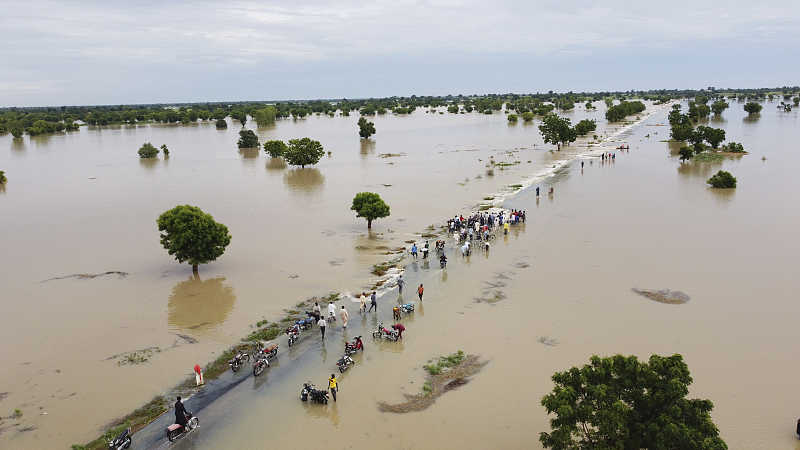Climate justice for our patients
- By Elisa de Siqueira
 0 Comment(s)
0 Comment(s) Print
Print E-mail China.org.cn, November 17, 2022
E-mail China.org.cn, November 17, 2022

Just a few months ago, we were reporting from Nigeria, Niger, and Chad on the most severe droughts in years. In the meantime, the situation has gone to the other extreme: These very countries are now affected by severe flooding. For the people, there is hardly a breather between one crisis and the next.
Most of such climate hotspots are across the countries where we operate. Many of them are on the African continent, where this year's World Climate Conference also happens to be taking place. In our humanitarian and climate crisis projects, we see people experiencing the health impacts of the climate crisis firsthand.
More support for people in need
The climate crisis is a threat to human health. But not all people are affected equally. As is so often the case, the people whose behavior contributes least to the climate crisis bear the greatest burden of the consequences. They pay with their health and, in some cases, with their lives.
We therefore see it as our duty to testify again this year at the World Climate Conference, being held in Sharm el-Sheikh, Egypt, about what we see in our projects and advocate decision-makers to provide greater support for people in need.
The climate crisis is hitting the most vulnerable
The difference between 1.5°C and 2°C or even 2.7°C global warming by 2030, as projected last year by the UN Environment Program, is life-threatening, and for many people around the world:
Drought means malnutrition. In 2020, heat waves resulted in more than 98 million people experiencing moderate to severe food insecurity, according to the Lancet Countdown 2022. Prolonged droughts, such as those in the Sahel region this year, mean that there is neither enough drinking water for people and animals nor sufficient irrigation for fields, so the soil dries out and harvests are smaller. Food supplies are then depleted early in the year, which can lead to malnutrition.
Warmer weather means mosquitoes and disease. Due to changing rainfall and a rise in temperature, the infection period of malaria, for example, is extended. Take, for example, Mozambique – today, in some parts of the country, there is a year-round risk of contracting malaria, rather than just during the rainy season.
Destruction by extreme weather. Tropical cyclones can become more frequent and stronger, as was the case in Madagascar at the beginning of the year with two successive cyclones. Hospitals were destroyed and many patients temporarily had no access to healthcare.
The loss of livelihood forces people to flee. Sometimes, however, people have no choice but to flee, as in southern Somalia, where many have been forced to leave their homes due to drought and prolonged conflict.
Particularly for those living in poverty and conflict contexts, people without social protection, and people who lack access to or are excluded from basic health care – in other words, our patients – a life-changing difference can be made here.
Every fraction of warming averted reduces death and suffering in the humanitarian contexts in which we work.
We already witness loss and damage – those responsible must act now
Climate action, i.e., mitigation of greenhouse gas emissions, should have been addressed long ago. The damage and losses that have resulted are irreversible in some places. Here, the consequences are already a reality: many human lives, (health) infrastructures, houses, schools, farmland, cultural, and spiritual places have been destroyed.
There, it is no longer just a matter of stopping climate change. Where we can, we must mitigate the consequences for people and their health. Especially through simple adaptation measures, such as building a dam or cleaning up water sources.
But if it's too late for that, we have to pay for the reconstruction after the destruction. Here we see mainly the countries that contribute most to the climate crisis, the G7 countries, for example, as being responsible.
What must happen
Humanitarian needs will grow beyond what Médecins Sans Frontières and other humanitarian actors can handle. Ambitious climate action, sustainable adaptation measures, and concrete and comprehensive support for dealing with damage and loss are needed.
We demand from the political representatives at the World Climate Conference, who are making decisions in Sharm el-Sheikh that will affect the health of millions of people: sufficient financial and technical support to address damage and loss, especially for those countries and people most affected. This must not involve the use of humanitarian aid funds. More ambitious and binding commitments from states, companies, and sectors primarily responsible for historical, current, and future emissions to keep global warming below 1.5°C.
The climate crisis must not be allowed to become an even greater humanitarian crisis. We need real climate justice for our patients now.
Elisa de Siqueira is humanitarian advocacy officer-climate crisis and humanitarian action, MSF Berlin.
Opinion articles reflect the views of their authors, not necessarily those of China.org.cn.
If you would like to contribute, please contact us at opinion@china.org.cn.






Go to Forum >>0 Comment(s)